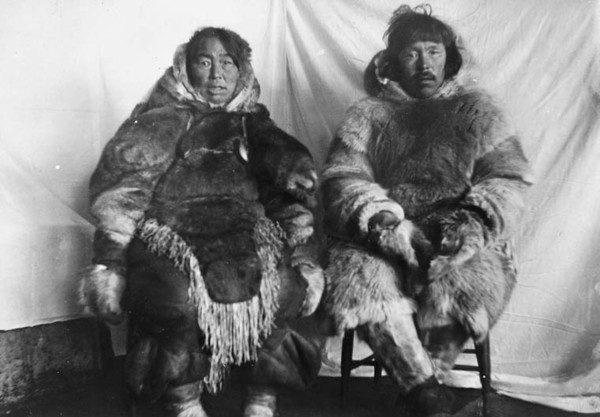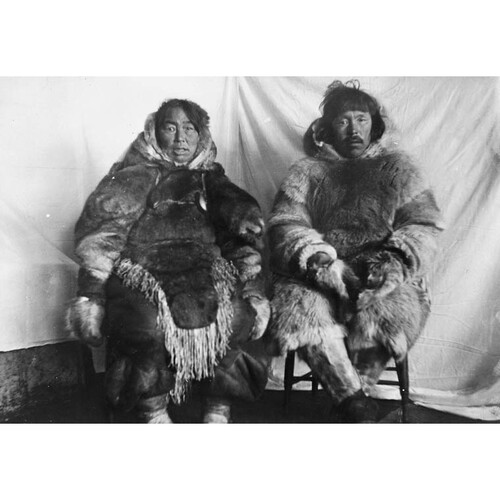MELIKI (Melichi; originally named Aussaar), Inuit artist and whaler; probably b. near Repulse Bay (N.W.T.); d. sometime between 1908 and 1910 on Southampton Island, N.W.T.
A member of the Aivilik tribe of hunters whose homeland was in the vicinity of Repulse Bay, Meliki probably spent most of his adult life working for the American whalers active in Hudson Bay from 1860 to 1915. According to family tradition, he was also a great dog-team traveller and was once part of a search-and-rescue expedition that went far to the north in search of lost white men.
W. Gillies Ross, the Canadian authority on whaling in the eastern Arctic, notes that Meliki “had been a regular ship’s native long before 1878 and carried on until his death.” Arctic whaling vessels depended heavily on the Inuit, and captains bartered for services. Inuit hunters supplied vessels with fresh country food, provided transportation by dog team, and served as whaling crews. Their wives made warm skin clothing. “Ships’ natives” were hired with their families to perform these tasks for specific vessels.
For a number of seasons after 1895, when American whaling captain George Comer made his first voyage to Hudson Bay as master, Meliki worked for the Era, Comer’s vessel. Comer was in close contact with anthropologist Franz Boas* and during expeditions to the Canadian Arctic gathered material to build up collections of Inuit artefacts in North American and European museums. Meliki’s sketches and maps make him probably the first Inuit artist whose name is known. Holdings in the American Museum of Natural History show that he did pages of drawings, some with a suggested possible date of 1898. Skilful and attractive, they show Inuit men and women in skin clothing and everyday scenes from Inuit life. The museum also has maps that he made for Comer representing sections of terrain familiar to the Inuit. One depicts a piece of coastline and has Inuit place-names inscribed on it, presumably by the captain; another portrays hunting trips for musk ox. Meliki is known to have done carvings as well.
Meliki spent his last years on Southampton Island, where after 1908 Comer encouraged his Inuit whaling crews to make their permanent camps. In the late 20th century he still had relatives there in Coral Harbour. Interviewed in 1983, Kanyuk Bruce, a granddaughter, noted that Meliki was a nephew of Harry, Comer’s chief native, and explained: “He got the name Meliki because Inuit couldn’t pronounce ‘American.’ Today there are still children called after him also named Meliki.”
Meliki’s likeness can be found among the many photographs taken by Comer during his whaling voyages to the Arctic. A glass negative and a lanternslide prepared by the captain are in the Comer collection at the Mystic Seaport museum in Mystic, Conn. Meliki is shown seated in a chair, wearing a plaid shirt of the sort descendants of the Inuit whalers say the Americans gave their people. Looking at the photograph of her grandfather, about whom she had only heard, Kanyuk Bruce declared, “He was not an ugly fellow.”
[Information on Meliki’s life was drawn from the published sources cited below and from interviews conducted by the author in 1983 with Kanyuk Bruce of Coral Harbour, N.W.T., and Joe Curley of Eskimo Point (Arviat), N.W.T., for the Urgent Ethnology Programme of the Canadian Museum of Civilization, Hull, Que. d.h.e.]
George Comer, An Arctic whaling diary: the journal of Captain George Comer in Hudson Bay, 1903–1905, ed. W. G. Ross (Toronto, 1984), 22, 179. Dorothy Harley Eber, When the whalers were up north: Inuit memories from the eastern Arctic (Kingston, Ont., 1989), 12. W. G. Ross, Whaling and Eskimos: Hudson Bay, 1860–1915 (Ottawa, 1975), 77, 82.
Cite This Article
Dorothy Harley Eber, “MELIKI (Melichi) (Aussaar),” in Dictionary of Canadian Biography, vol. 13, University of Toronto/Université Laval, 2003–, accessed January 1, 2026, https://www.biographi.ca/en/bio/meliki_13E.html.
The citation above shows the format for footnotes and endnotes according to the Chicago manual of style (16th edition). Information to be used in other citation formats:
| Permalink: | https://www.biographi.ca/en/bio/meliki_13E.html |
| Author of Article: | Dorothy Harley Eber |
| Title of Article: | MELIKI (Melichi) (Aussaar) |
| Publication Name: | Dictionary of Canadian Biography, vol. 13 |
| Publisher: | University of Toronto/Université Laval |
| Year of publication: | 1994 |
| Year of revision: | 1994 |
| Access Date: | January 1, 2026 |




